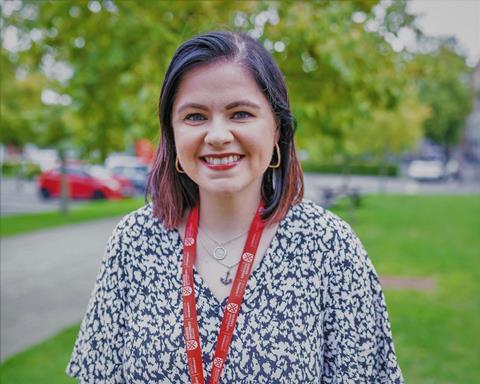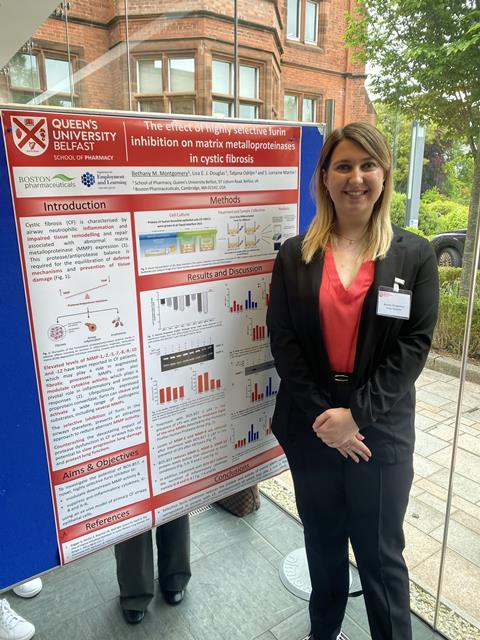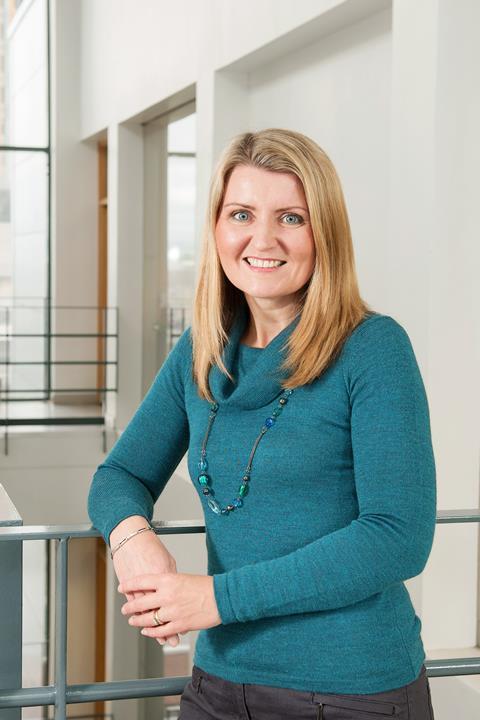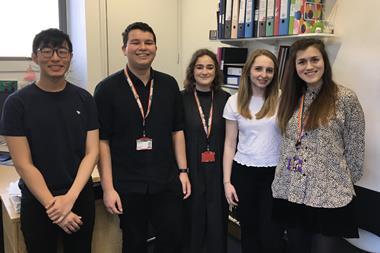Schemes that recognise the roles that senior PhDs and postdocs play in training new lab members

The first foray into the world of research can be extremely daunting. Filled with unfamiliar equipment, new techniques and an intimidating academic hierarchy, many students enter with little idea what to expect. Practical in-lab supervision of new research students has therefore always been a vital part of scientific training, turning inexperienced students into safe, efficient and confident researchers. Different groups and institutions organise this crucial induction into research in a variety of formal and informal ways.
Paying it forward
The most widespread teaching practice is that of informal mentoring by senior lab-based group members. This is how Ross Denton, an organic chemist at the University of Nottingham in the UK organises his group, based on his own positive experiences as a postdoc. ‘The whole structure is based on the fact that people with more experience (ie postdocs and senior PhDs) get more supervisory duties and therefore they can pass on their experiences to the more junior people in the group,’ explains Denton. ‘There’s a lot of information present within a research group, so there’s a big compounding effect where all of our collective experiences and knowledge are shared and we can all benefit from that exchange.’
Incoming master’s and PhD students are all assigned a senior group member working on a related project. While overall supervision of the project remains with Denton, the supervising group member is there to provide practical instruction and day-to-day project support, aiding the student with the transition into a research environment. This specific point-of-contact is hugely beneficial to new students who can often feel overwhelmed with the unusual demands of lab work or intimidated to ask for help with routine practical tasks, even in the friendliest group environment. ‘Going from [an undergraduate lab] into a [research] lab was vastly different,’ remembers Milly Stoneley, a current PhD student in the Denton group. ‘Having someone there to walk me through every single step, multiple times if necessary, was really helpful [and] I felt very supported.’
But it’s not just the students who benefit from this arrangement. The informal supervision framework is a valuable chance for senior members to develop transferable soft skills in communication and management. ‘Those skills are useful in any career where you have to look after other people, but particularly in terms of the academic career track,’ says Tom Barber, a supervising postdoc in the Denton group. ‘Student supervision is the ideal opportunity to practise and build those skills to make sure that you’re able to guide other people.’
The tiered organisational structure also streamlines communication within the group, helping the team to operate more efficiently overall. Most principal investigators (PIs) are burdened with a huge number of administrative and teaching responsibilities, in addition to overseeing the activities of their research group. Delegating supervision responsibilities therefore enables group members to resolve relatively trivial issues without involving the PI. Denton is also keen to use this as an opportunity to boost the confidence and autonomy of his team. ‘I like to give everyone some responsibility – I think if you hire a team of people, then you should have trust in them to do a good job and give them the freedom to do it,’ he says. ‘In any case, it’s been such a long time since I’ve done any lab work, I probably wouldn’t be the best person to ask about practical problems now! The knowledge exchange goes both ways.’
This internal support structure promotes both individual growth and group success and the contributions of these supporting members are evidently highly valued. However, obtaining recognition for that work externally remains a significant problem across the scientific community.
Credit where credit’s due
This issue of recognition was highlighted in a 2014 university-wide survey at Imperial College London, UK, that formed part of a bigger project evaluating the quality of supervision across the Graduate School. ‘Over 1500 PhD students and 400 members of academic staff contributed and one of the things that came through really strongly was that postdocs play an absolutely crucial role in supervision at Imperial and we needed to do something to recognise them,’ explains Laura Lane, head of strategy and operations at the university.
Following this clear feedback, a dedicated working party developed a framework to formally acknowledge the contributions made by postdocs and began looking at ways to better support them in supervisory roles. In 2017 the team piloted the Assistant Supervisor scheme through the Postdoctoral Fellows Development Centre, launching it fully across the university the following year. Since then, more than 450 postdocs have held the assistant supervisor title. ‘All postdocs at Imperial are eligible,’ explains Victoria Crossley, Cornerstone programme lead at the university. ‘As part of the scheme, postdocs must undertake some mandatory training, which allows them to have an opportunity to reflect on their own supervisory practice and defines the roles, responsibilities and boundaries associated with the title.’
You start to get a bit of foresight for what’s coming in the next stage of your career
Unlike the traditional model of supervision, assistant supervisors aren’t attached to a specific student, instead providing more overarching support to students within their research groups. The exact nature of supervision is agreed between the PI and the assistant supervisor, with typical responsibilities including practical and health and safety instruction, providing informal feedback on written work and presentations, giving project guidance and signposting students to appropriate technicians and university services. Vitally, this explicit statement of expectations and boundaries prevents postdocs becoming overburdened by supervision responsibilities and helps to ensure all group members know how and where to access the most appropriate help.

For Stuart Higgins, a former assistant supervisor at Imperial and now a lecturer at the University of York, participating in the scheme was a real highlight of his postdoc experience and helped crystallise his ambition to pursue a career in academia. ‘It really helped me understand that I loved the supervisory part of the job: talking to people about their data, helping them solve problems and supporting them through their projects,’ he explains. ‘Assistant supervisor is a formal job role and included a change in my contract so the experience was also really useful when I was applying for lectureships because it helped clearly delineate my career – it shows progression rather than just having one homogeneous block of postdoc.’
Higgins also credits the training opportunities offered by the Postdoctoral Fellows Development Centre as a key part of preparing him for his current role. ‘Having access to the initial training was brilliant and it motivated me to seek more management training at a higher level, which was really useful,’ he says. ‘You start to get a bit of foresight for what’s coming in the next stage of your career.’
Benefitting everyone
Extensive additional professional development opportunities are also a huge part of the assistant supervisor scheme at Queen’s University Belfast. This thorough training has been a key part of postdoc Lisa Douglas’s positive supervisory experience. ‘Our Postdoctoral Development Centre (PDC) is very proactive in providing training and professional development for postdocs. In particular, a specific supervising skills for assistant supervisors course is offered, which includes training on effective feedback, communication and other people management skills,’ she says. ‘Having the formal title also encourages postdocs to avail of other leadership and management staff training and development courses. I feel the PDC offers me a lot of support, which has helped me become a better supervisor and a more rounded researcher.’
Operating more like the traditional supervisory model, the assistant supervisor scheme at Queen’s formally associates a postdoc with a PhD student and their project, under the broader supervision of a PI. Douglas is part of Lorraine Martin’s group within the department of pharmacology and has been supervising PhD student Bethany Montgomery under the scheme for two years. Douglas’s support helped Montgomery adapt and build confidence as a new PhD student with no research experience. But importantly, the formal acknowledgement of Douglas’s responsibilities helped Montgomery make full use of the support available to her. ‘Having a label on it makes it so much easier,’ Montgomery explains. ‘I feel very comfortable going to Lisa in her role as my assistant supervisor knowing that the work she does in helping me achieve my PhD is recognised by the university. It removes that guilt about disturbing her and bothering her with questions, so asking for help now feels a lot more accessible.’

Martin actively encourages her team to access support and professional development opportunities alongside their research and agrees that joining the assistant supervisor scheme has brought benefits across the group. However, she is keen to emphasise that the impacts of formal recognition extend beyond simply appreciating postdocs’ contributions within the group. ‘I’d like to think my postdocs know how valued they are, but with the introduction of the assistant supervisor role it’s much more tangible now,’ says Martin. ‘A much wider context to the role is that it also promotes and highlights their professional expertise, particularly when dealing with external partners. In terms of career development, formal recognition of their supervision and management experience can contribute to formal qualifications such as associate fellow of the Higher Education Academy, which benefits researchers when applying to lectureship posts.’
Whatever the support structure, student supervision is beneficial for everyone involved. The goal of any PhD or master’s programme is to develop confident, independent researchers who will ultimately go on to have successful careers, either in or outside of the research community. Different levels of support – informal mentoring by group members, structured supervision by a senior researcher, or formal meetings and training through the university – all contribute to a full and varied student experience and the crucial role of assistant supervisors within this cannot be overlooked.
Tips for becoming a better supervisor
Get to know your student
Communication is key to a successful student-supervisor partnership. Explain new concepts at your student’s level and identify their learning style to tailor your teaching to their needs.
Build your student’s agency
It’s their project after all! Once you’re confident they are working safely and ethically, give them space to take the project in their own direction, make a few mistakes, and learn a few things themselves.
Learn how the university works
Every institution runs their master’s and PhD programmes slightly differently. Understanding the assessment criteria and project checkpoints will help you plan ahead and guide your student mentee through these stressful periods.
Take advantage of training provided within your institution
Most universities offer professional development courses internally so look at what’s available for your level. If you can’t find what you’re looking for, send an e-mail to the organisers who may be able to notify you when an appropriate course opens.
Find support online
A number of institutions and organisations provide free online resources for researchers involved in supervision. The UK Council for Graduate Education runs free events and recognition schemes for postdoc supervisors.

















No comments yet